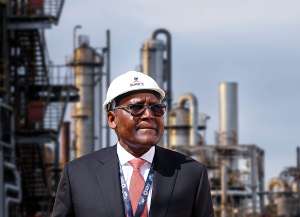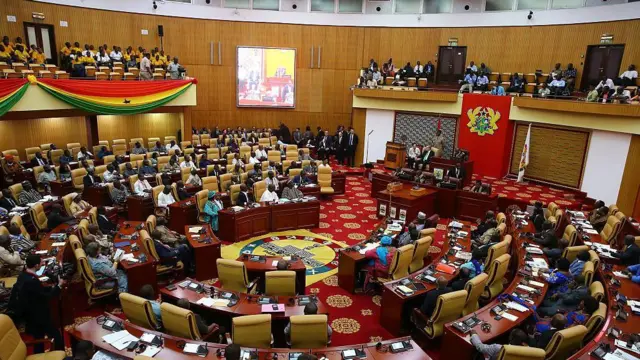Ghana is set to redefine its fuel import strategy, prioritizing petroleum products from Nigeria’s Dangote Petroleum Refinery as soon as the facility reaches full operational capacity.
The shift aims to reduce Ghana’s dependency on costly European fuel imports, a move that could stabilize local fuel prices and lessen the impact of global market fluctuations on Ghana’s economy. The announcement was made by Mustapha Abdul-Hamid, Chairman of Ghana’s National Petroleum Authority (NPA), during the OTL Africa Downstream Oil Conference in Lagos, Nigeria.
“If the refinery reaches 650,000 bpd capacity, all that volume cannot be consumed by Nigeria alone. So instead of importing from Rotterdam as we do now, it will be much easier for us to import from Nigeria, and I believe that will bring down our prices.”
Mustapha Abdul-Hamid, Chairman of Ghana’s National Petroleum Authority (NPA)
At present, Ghana relies heavily on European imports for its fuel, spending approximately $400 million monthly to meet local demand. Abdul-Hamid emphasized that importing from the Dangote Refinery, which is geographically closer than European suppliers, is expected to drastically cut down freight costs, directly impacting fuel prices in Ghana.
He expressed optimism that by sourcing fuel from Nigeria, Ghana could potentially see a significant reduction in fuel prices.
The Dangote Petroleum Refinery, located in Lekki, Lagos, stands as Africa’s largest oil refinery, capable of producing up to 650,000 barrels per day (bpd).
This $20 billion project, spearheaded by Nigerian billionaire Aliko Dangote, is expected to serve as a regional powerhouse, meeting not only Nigeria’s fuel demands but also catering to surrounding African markets, including Ghana.
Since the refinery began releasing Premium Motor Spirit (PMS), or petrol, into the Nigerian market in September 2024, local and regional expectations have been high for its potential impact on the fuel supply landscape.
The refinery’s operational capacity far exceeds Nigeria’s domestic consumption, creating a unique opportunity for regional exports.
For Ghana, this would mean a more affordable and reliable fuel source right within the continent, helping to insulate the country from external market pressures, especially those related to price volatility in Europe and freight costs associated with long-distance imports.
New Chapter for Regional Integration

The shift in Ghana’s import strategy aligns with broader ambitions for regional economic integration in Africa. By strengthening trade ties within the continent, African countries stand to reduce dependency on international markets and build a more resilient and interconnected economy.
The Dangote Refinery could become a central hub for such integration in the energy sector, supplying not only Ghana but also other West African nations in need of refined petroleum products.
Abdul-Hamid highlighted this vision during the conference, noting that “a more integrated African energy market could lead to a harmonized approach to pricing and supply, ultimately benefiting consumers across the continent.”
A shared approach to energy resources, coupled with the African Continental Free Trade Area (AfCFTA) agreement, which aims to create a single market for goods and services, could enhance economic stability and growth prospects for all African nations involved.
Ghana’s demand for fuel has surged alongside its economic growth, which saw a remarkable year-on-year increase of 6.9% in the second quarter of 2024. This growth was driven largely by the extractive industry, which includes mining and oil production.
As the economy expands, so too does the need for reliable and affordable energy sources. By 2025, when the Dangote Refinery is expected to reach full capacity, Ghana’s fuel needs will likely be higher than ever, making the timing ideal for a new import strategy.
Increased fuel availability at lower costs could support sustained economic growth by providing energy for expanding industries, especially in the extractive and manufacturing sectors.
Furthermore, stable and affordable fuel prices could encourage further investment into the Ghanaian economy, as businesses benefit from lower operating costs.
By sourcing fuel locally within Africa, Ghana could significantly reduce its monthly expenditure on imports, stabilize fuel prices, and create an environment conducive to economic growth.
However, realizing these benefits will depend on strategic negotiations and a commitment to fostering stronger economic ties with Nigeria and other African neighbors.
READ ALSO: Burkina Faso Accused of Endangering Civilians During Jihadist Attack




















